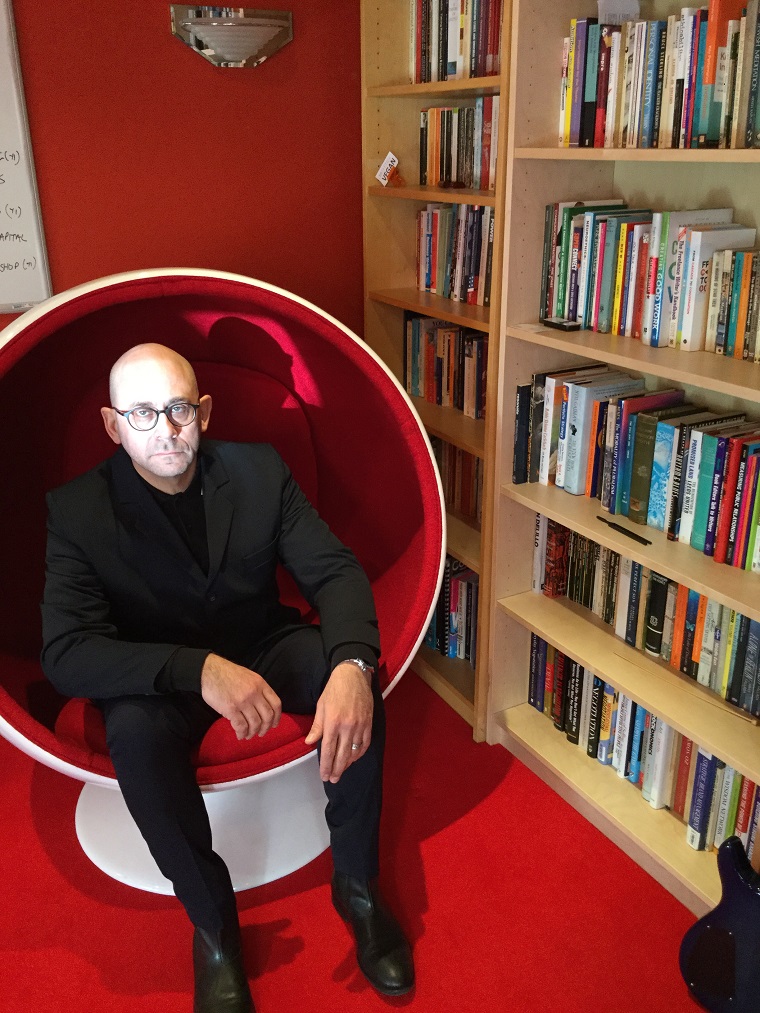PR Spotlight: Ezri Carlebach
Ezri Carlebach is a consultant, writer, lecturer, and senior associate at the PR Network. In this spotlight, Ezri chats to us about the lessons he has learned leading major change communications in the financial services sector, why PR is a natural place to develop ‘design thinking’, why he thinks PRs have a major opportunity to become catalysts of economic activism, and why how he thinks the trend of ‘fake news’ will impact PR in 2017.
Can you introduce yourself and speak a little about your professional background? I’m Ezri Carlebach, originally from sunny Brighton and now based in North London. There are two main strands to my background. I started my career as a peripatetic double bass player performing around the UK and Europe, and did that for ten years. Then I switched to publishing while getting a degree in Humanities at Birkbeck College in the evenings. This led to a twenty-year career in corporate communications, heading up internal and external comms in a variety of organisations, including global FTSE 100 brands, non-profits, and government agencies. Now I’m a senior associate at The PR Network, a freelance writer focusing on the education and arts and culture sectors, and a Visiting Lecturer in Public Relations at the University of Greenwich.
Throughout your career, you have led major change communications in the financial services sector and high-profile rebrands in arts and education institutions. What are the biggest lessons you’ve learnt about the PR industry through this experience? I’d say the biggest single lesson is that it’s about being human. It’s easy to lose sight of that, especially in the era of big data and artificial intelligence, and even words like ‘stakeholder’ and ‘audience’ and ‘public’ are aggregates that can subtly obscure the human element of public relations practice. If dear old Eward Bernays had come up with a different phrase than ‘counsel on public relations’, things might have turned out differently!
One thing you often talk about is the principles of design thinking. Can you explain what it is and why PR is a natural place to develop design thinking approaches? For me, the key to all this talk about ‘design thinking’ is the word ‘thinking’. Again, that ability to think is what makes us human, and anything that puts thinking in the foreground is valuable. There’s an anecdote about the famous inventor Barnes Wallis, designer of the ‘bouncing bomb’ used in the Dam Busters raid in World War II, that gives a sense of what I mean. Wallis failed the London matriculation exam when he was sixteen and went to Christ’s Hospital where he experienced a ‘heuristic’ form of education developed by the famous chemist Henry Armstrong. The method concentrates on developing a problem-solving attitude, making the learner as active as possible, and encouraging divergent thinking.
You’ve been quoted as saying that by combining the strategic and social strands of public relations, PR professionals have the opportunity to become catalysts in realising the potential of economic activism and social dialogue. Could you expand on this comment? All I mean is that ‘strategic’ goals, which are achieved despite the consequences for external actors, can be tempered by ‘social’ goals, which are achieved because of the consequences for external actors. In this way, organisations can establish a form of legitimacy that many are currently struggling for (think financial services, energy, pharma). The opportunity for PR professionals, and other disciplines such as internal comms, is, in their growing role as coaches and confidants to organisational leaders, to show how communication can lead that process. Economic activism, to me, means both generating economic value, and having the awareness to connect that value to social ends. The growing area of social enterprise is a good example.
Social dialogue, in turn, is the method by which that connection happens – essentially, it requires good governance in relations between people, organisations, and governments. This language may seem strange to some in PR, but that’s the point – it’s about bringing together a range of social, economic, and political approaches to create change in organisational behaviours and in PR practice.
With everything that is currently happening in the world with Trump and Brexit, do you think PR should adopt more activist behaviour with social aims? Given the global context, my view is that compassion and common humanity must come before narrow self-interest. That’s a political stance, and I don’t expect everyone in the PR industry to share it. However, in these challenging times, I remember the remark made by Martin Luther King Jr; “The arc of the moral universe is long, but it bends towards justice.”
Digitally-driven social networking in the last ten years has had a huge impact on the PR industry. How is this pushing public relations professionals to rethink their business function and societal position? Digital is one head of the hydra that is currently terrorising the world. The others are globalisation and climate change. These are not inherently bad things (even climate change, because if we are to reverse its damaging effects we will have to engage in further climate change in order to do so). But they are certainly complex and challenging. So the impact of digitally-driven social networking on PR is a particular manifestation of these wider trends. There are much-discussed effects, including the loss of control of messaging, particularly in a crisis, and a de-skilling of older PR professionals, but I’m not sure that PR professionals have really been pushed to rethink their business function and societal position as much as you might expect. Those issues have to be looked at in the context of digitalisation’s impact on business as a whole and its interconnectedness with globalisation.
The rise of big data has renewed the challenge of measurement, which has presented new challenges to the PR industry. Considering this factor how can PRs appropriate the use of data analysis, perhaps by using media database companies like Vuelio?
I love measurement, I think it’s important for comms disciplines in many ways, and I’m all for the tools and techniques that companies like Vuelio offer.
Applied with intelligence these approaches can provide valuable means to develop insights and solve problems. The insights and the problem-solving, of course, remain distinctively human functions, so I would add the caveat that the data and data management systems, however sophisticated they get, do not provide answers in and of themselves. It still takes people to do that!
How can PRs balance the growing need to understand data with the emotional aspects of good PR, such as storytelling? Interestingly the two are very much connected. The work of people like Dave Snowden at IBM and Steve Denning at the World Bank was all about using storytelling to make data understandable. Denning’s book The Springboard: How Storytelling Ignites Action in Knowledge-Era Organizations is a great introduction to this. So I don’t think there’s a contradiction between understanding data and storytelling. What I would urge is a return to the balance advocated by Aristotle a couple of thousand years ago, when he identified ethos, pathos, and logos as the essential ingredients of good rhetoric. In other words, data can provides the logos, or evidence and reasoned argument; the ethos is the spirit or motivation (or ‘purpose’ to use the current term); and the pathos is the emotional connection which makes the story you want to tell appealing to other people.
You’ve been quoted in the past as saying PR is craft-based because the core requirement of PR practitioners remains writing and that the most important skill in-house and agency recruiters are looking for is writing ability. Do you still think this is true in 2017? Undoubtedly. As the USC Annenberg Center on Public Relations and the Holmes Report noted in their 2016 Global Communications Report, writing is by far the most important skill that both in-house and agency recruiters look for when hiring. They call writing skills a “price of admission” to the PR industry.
Good writing skills rely on good thinking skills. So writing, design thinking, good governance – all these things are connected. There’s no contradiction between the craft element and the professionalisation of PR either, they’re two sides of the same coin.
What big trends do you think we will see in relation to the PR industry this year? I think we’re going to be dealing with the so-called fake news and alternative facts scenario for some time to come. One way of responding is by showing your support for comms industry bodies, all of whom are fighting to maintain ethical standards in communication. See, for example, what IABC has said about this.
What’s been your proudest professional achievement? I think it would have to be the comms and PR for the 250th anniversary of the Royal Society of Arts. It had so many different elements – events, publications, special awards, even a set of commemorative Royal Mail stamps! – and helped to both celebrate the great traditions of what is genuinely, in my opinion, a unique organisation, and at the same time make the work of the RSA more accessible and engaging.
What motivates you to achieve your goals? The thought that the work I’m engaged in is valuable, has meaning, and does little harm.
What’s next for you? Will you be working on any exciting projects in the near future? All sorts of exciting things are coming up, including the IABC EMENA region conference, EuroComm; the IABC World Conference, as mentioned above; ongoing work with wonderful clients in Italy, Belgium, Denmark and the UK; continuing to improve my teaching skills; and getting the odd moment here and there with my double bass!






Leave a Comment